It started out as a simple trip. I wanted a solo (for the most part) backpacking trip: bare bones, no frills, just me and the sense of wonder that comes with being somewhere completely different. Not the kind of trip immortalised in novels and movies, some coming-of-age journey of self-discovery.
Also read: Top 5 Destinations to Visit in South Korea Beyond Just Seoul
No, I just wanted to be somewhere else for a while. In this case, “a while” became “six weeks”, and “somewhere else” became “Korea”. I learned a lot over those six weeks, and here are seven of those lessons.
1. People are kinder than you think they are
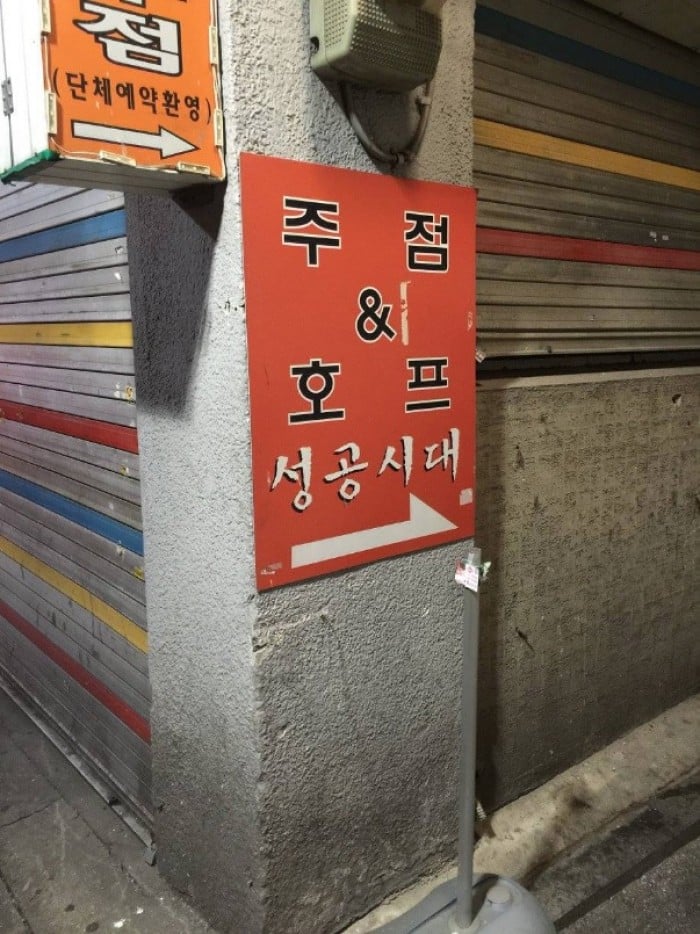
A sign along the way that didn’t really help. We were very lost.
A big misconception many newbie travellers have is that strangers will take advantage of them. Travelling alone, especially, can make you extra wary of those who offer you help but often, they do it sincerely and without any hidden agenda. People are—for the most part, at least—good.
When my friend and I first arrived in Korea, we took a cab down from the airport to Seoul, because it was late and the buses had stopped running. Our driver dropped us off in the area of our hostel, but we had no clue how to actually get there. In the end, he helped us ask the owner of a nearby restaurant, who gave us directions. We followed it but were still unable to find our hostel. We were tired and hungry and scared. Eventually, an old ahjussi saw us wandering around and waved us into the store he manned. I admit, we were suspicious and wary at first. But we went anyway, and after we showed him the address and contact number of our place, he helped us phone the hostel owner, who came all the way down to the convenience store to pick us up.
Imagine this: you’ve just arrived in a country that you’ve never been to before, whose language you do not speak, at midnight. You can’t find your way around because you don’t have a SIM card, you can’t read anything, and you can’t even ask for directions properly. In the end, you fall back on the kindness of others. No hidden, ulterior motives. Just kindness.
2. It’s okay to be a tourist
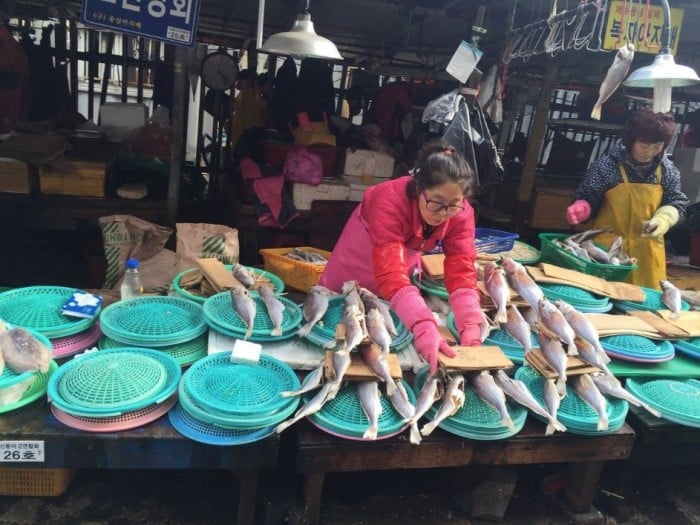
A fishmonger at Jagalchi Market
I think people have grand delusions about what it is like to travel out of your country. I certainly did. I wanted to travel off the beaten path, wanted to connect with the locals, to really immerse myself in the culture. I didn’t want to go the way of organised tours and groups.
But, sometimes, there’s nothing inherently wrong with being a tourist. You are a foreigner after all, there’s no changing that, and it’s okay to be one, as long as you are respectful. There’s no need to avoid tourist hotspots. I visited the largest and most touristy fish market in Korea (the only people who actually bought anything there didn’t even speak Korean). I put on a hanbok and visited famous shrines. I took a million photos along the streets of Insadong. I overlooked the more historical aspect of Gyeongbokgung in favour of taking many photos of the cherry blossoms and posting them on Instagram.
Was I a traveller, or was I a tourist? I think the distinction between the two is blurry and, in the end, it doesn’t really matter. Traveller or tourist, you are still a non-local experiencing another culture. I don’t think we need to be preoccupied with thinking about whether we are truly immersing ourselves or merely taking away something at a surface level. As long as we’ve tried our best to be respectful, to understand, and to learn, that’s more than enough.
3. Some of your best days will be spent aimlessly wandering around
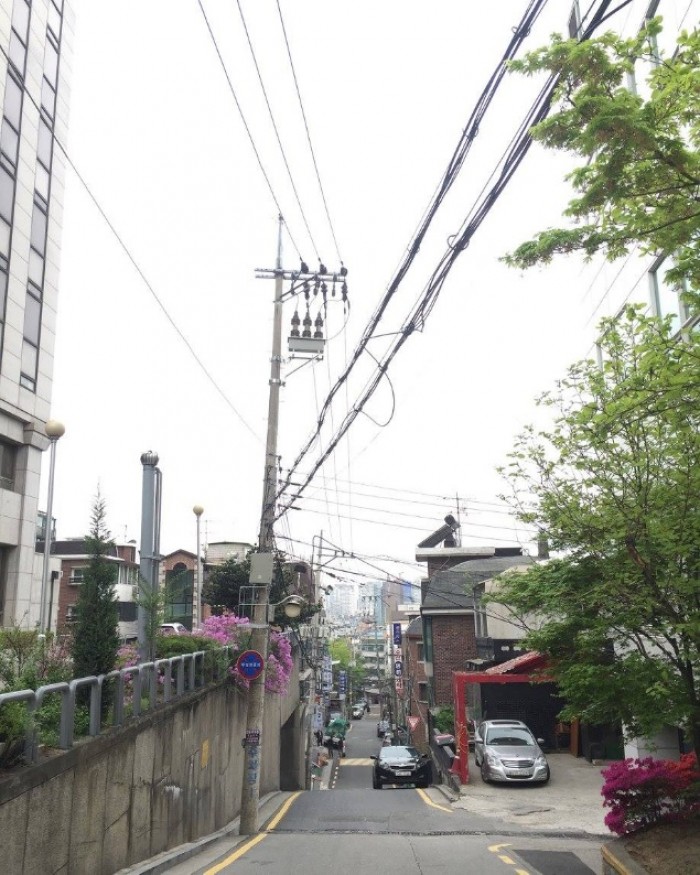
Aimless wandering in Gangnam.
There are two days that stick out to me amongst the other forty-two.
The first is when I walked around Gangnam for a whole day. Now, Gangnam isn’t anything particularly unique or special. (Gangnam Style is a great music video, but the real Gangnam definitely does not feature beaches and horse stables.) In fact, it was painfully hilly and I had a pretty tough time walking around so much. But it was fun. I got to see office employees rushing out for smoke breaks. A car rushed by me, Arctic Monkeys blasting from the windows. I didn’t have to stick to a schedule or rush to an attraction or bump elbows with the subway crowds.
The second is when I spent my first night at the Han River. The Han River is a monster, in the best way possible. Two kilometres wide and a pitch black abyss at night. Staring at it, whether from its banks or from its many bridges, is an experience everyone should have.
I walked across Mapo Bridge, also known as the bridge where people commit suicide, and both the messages persuading people not to jump and the amazing view still stick with me today. Watching the water, dark and murky and ominous, shimmer beneath your feet as you walk from one side of the river to another—I don’t think I will ever forget that feeling. I liked Han River so much that I ended up walking around the river banks for hours on end.
4. Make detours—but also make sure you know how to find your way back
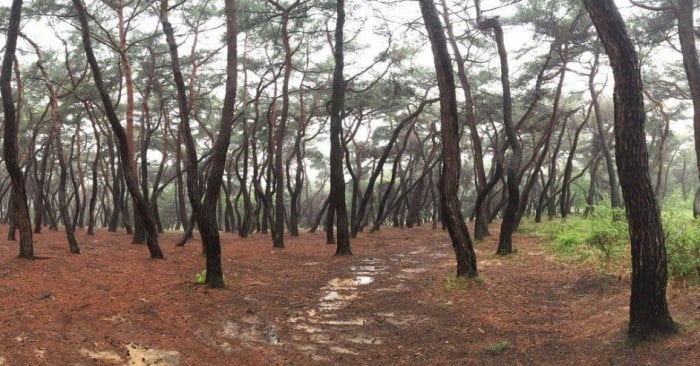
When you’re lost, the only thing to do is to take a photograph
This is sort of related to the point above. When you aimlessly wander, you might not take full notice of which direction you turn. You might even veer off paved roads completely.
On one instance, I’d been hiking up Namsan in Gyeongju. Not only that, I was alone, it was raining, there were no other hikers, and I had long since given up on trying to use my umbrella because it was getting in the way. I looked to my right, and there was a bright flash of colour—bright orange, like autumn leaves. It took only two seconds to decide to make the detour.
It was definitely not on the path. I had to climb over a few small bushes to get to the clearing, but the ground was a gorgeous shade of crimson and. Slightly damp and shimmering from the drizzle, it was beautiful. I made my way to the middle, walking around, heading further and further away from the place where I’d entered. And when I finally got my fill of the place, I realised I had no idea how to get out.
I still remember how my throat twisted at the realisation, the moment of panic that clawed its way forward. In the end, I found my way out, but it was still a scary experience. I don’t regret making that detour, not at all, and I would definitely do it again. But this time, I will make sure that I know how to head back.
5. If you want to step into the shoes of a local, head for the trains
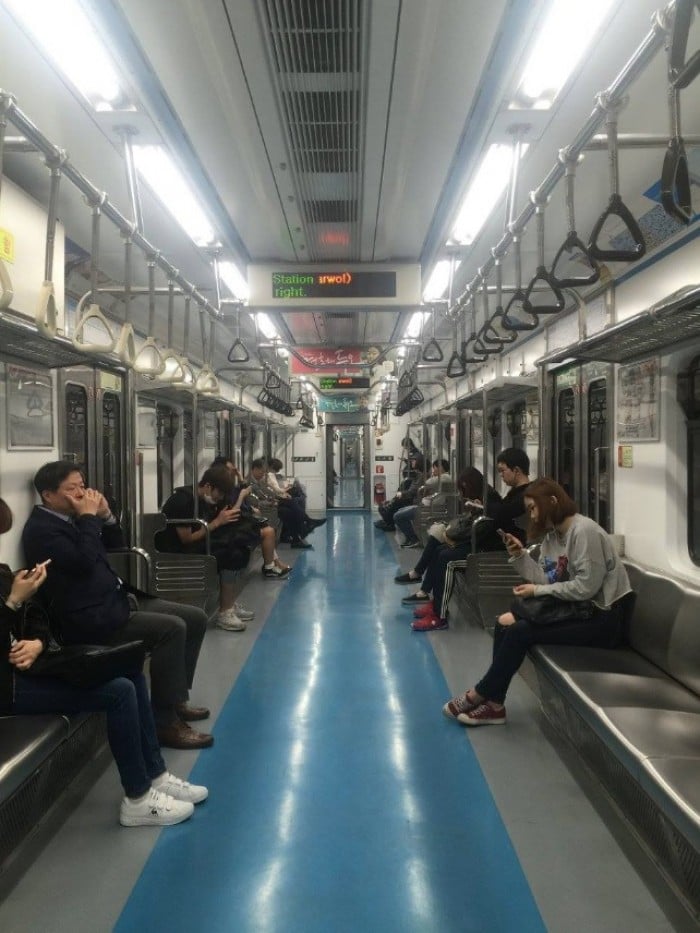
Empty trains make me feel all warm inside
Back home in Singapore, I absolutely hate taking trains. Trains are congested and crowded and you’re pressed against everyone else. No one’s happy, not when they have to get to work on a Monday and it’s eight forty-two and they haven’t even had time to have breakfast.
In Korea, it’s not very much different. Granted, people are slightly less angsty and trains are slightly less crowded (at least from what I’ve experienced), but they offer an incredible glimpse into the life of a local. As mundane as it might be to observe someone sitting down and scrolling through their phone, reading the latest manhwa, it is still a big part of their lives.
Some other scenes from the subway: peddlers coming in and placing flyers on everyone’s lap and no one even so much as blinks. Two stations later, they collect all the flyers back and have hop off the train, because they’re not actually supposed to sell anything. Or everyone dressed in similar clothing, both guys and girls alike, in an oversized sweater and skinny jeans. You can see many things on trains, even if you take yourself out of the picture.
Sometimes, I felt weird travelling on trains. I was constantly thinking “is someone looking at me?” and “am I not blending in well?” This was even worse when I was travelling with my giant backpack. I had an ever-present worry that I was being a nuisance to those around me.
6. Bring hike-up shoes, seriously
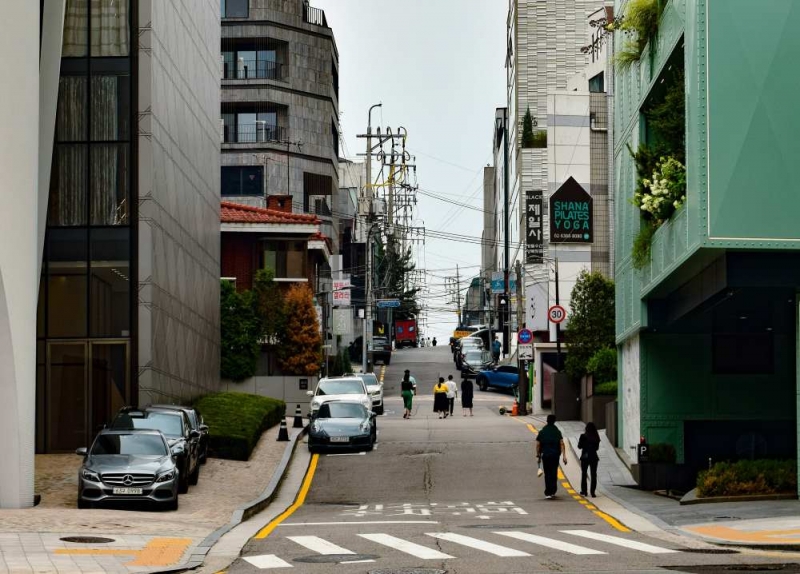
I’ll never forget the day I decided to explore Gangnam on a whim. With no real plan and just a general idea of where I wanted to go, I set off, excited to see what the city had to offer. As I wandered through the bustling streets, I couldn’t help but feel a sense of adventure.
But my excitement quickly turned to frustration when I realized just how hilly Gangnam was. My wedges were no match for the incline. My feet ached with every step, and I found myself struggling to keep up with the locals. That day, I learned to always bring hike-ready shoes when exploring a city with hilly terrain.
7. It’s okay to be tired

There’s nothing wrong with doing nothing, as this corgi will tell you.
It’s okay to run out of steam. Whether you’re travelling for six days or six weeks or six months, you’re still travelling. It’s a disruption in your regular routine, one where you’re expected (by society, at least) to Get Out There! and Explore!, even if at the expense of sleep and energy – because you’re there already, you might as well.
I was definitely tired at some points. Not physically, but mentally as well. I spent more than one day simply bumming around the hostel, only emerging from my rabbit hole that is the bottom bunk for irregular trips to the convenience store. (Once, I headed out to the convenience store after showering, with wet hair and slippers and even a small towel around my neck. I actually dropped the towel on the road, only realising when I was back at the hostel, and had to walk ten minutes back out just to collect my towel.)
I admit, I did feel guilty. I’d flown all the way out to Korea and I was not even making the most out of it. But looking back, I realise that if I had really gone out on those days where fatigue had bitten me to the bone, I wouldn’t have enjoyed exploring as much as I could have anyway.
A trip doesn’t always have to be inundated with visiting attractions or actively absorbing the culture. Sometimes, after walking around for ten hours a day for ten days straight, you get tired. You get exhausted. Your feet ache and your thighs ache and your butt aches and it’s okay. No one ever said you’re not allowed to rest.
You might be your own worst critic, scolding yourself for dropping money on a trip and then not even bothering to go out, but we all have to learn not to be so harsh on ourselves. Sometimes, it’s just as rewarding to sit in the common area of your hostel with a cup of coffee on your left and a conversation with a fellow traveller and a local on your right, typing away on your laptop.
Also read: Seoul Itinerary: All the Best Places to Go for a 5-Day Trip!




